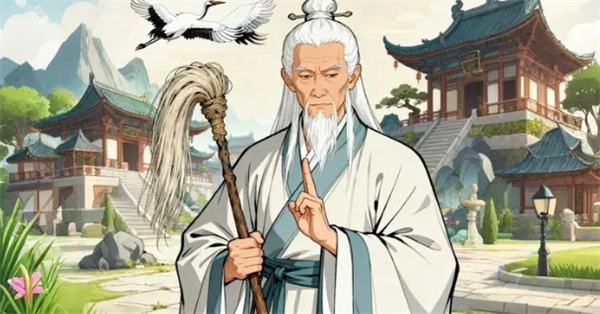Next Stop Jianghu 2 Taoist Priest Qingxuan’s Taoist Discussion Guide
Oct 15 2025
In Next Station Jianghu 2, there are many questions that need to be answered, and many players do not know the answers to these questions. The following is a guide for Taoist Qingxuan's discussion in Next Station Jianghu 2. Players in need can refer to it.

Next Stop Jianghu 2 Qingxuan Taoist Discourse
1. Why does Lao Tzu advocate "retiring after one's success"
Answer: After the matter is successful, you should exit in time to avoid disputes
2. How does Lao Tzu define "Heaven and Earth are unkind"
Answer: The universe is selfless and all things are equal
3. Why does Lao Tzu say that "heavy emphasis is the root, tranquility is the king of impatience"
Answer: Stability and calmness are the foundation of things
4. Why does Lao Tzu believe that “contentment always brings happiness”
Answer: Contentment can avoid the pain caused by desire
5. How does Lao Tzu explain "the weak is stronger than the strong"
Answer: Weakness can adapt to changes and last longer
6. Why does Laozi believe that "the Tao is always inactive and does not do anything"
Answer: Follow nature without human intervention
7. Why does Lao Tzu advocate "less is gain, more is confusion"
Answer: People with fewer desires are more likely to be satisfied
8. How should Laozi’s belief that “the best is as good as water” be practiced?
Answer: Learn the weakness and tolerance of water
9. How does Lao Tzu define "governing a big country is like cooking small delicacies"
Answer: Governing the country requires caution
10. What does Lao Tzu mean by "the Tao can be Tao, but it is not Tao"
Answer: The true "Tao" cannot be fully expressed in words
11. How does Lao Tzu explain "the sage does not accumulate"
Answer: A saint selflessly gives what he possesses to others
12. How does Lao Tzu view "doing things without fighting"
Answer: Do not act in competition with others
13. Why does Lao Tzu believe that "good fortune and misfortune depend on each other"
Answer: Misfortune and luck are relative and can be converted into each other
14. Why does Laozi believe that "the Tao always does nothing but does nothing"
Answer: Follow nature without human intervention
15. What does Lao Tzu mean by "Everything in the world is beautiful only because it is beautiful, but this is evil"
Answer: Beauty and ugliness are relative. Emphasizing one will bring about the other
16. How does Lao Tzu view "the strong shall not die"
Answer: People who are too strong are prone to accidents
17. What does Lao Tzu mean by "Trustful words are not beautiful, and beautiful words are not believed"
Answer: Sincere words may not sound pleasant, and pleasant words may not be sincere
18. How does Lao Tzu explain that "holding on and making a profit is not as good as what you already have"
Answer: Excessive pursuit will lead to loss
19. Why does Laozi advocate "seeing simplicity and embracing simplicity"
Answer: Return to the essence of things and keep your heart simple
20. What does Lao Tzu mean by "governing by doing nothing"
Answer: Let nature take its course and reduce human intervention
21. What is the reason why Lao Tzu believes that "eternal life" is the norm?
Answer: Heaven and earth are selfless and there is no competition for them
22. Why does Laozi advocate "knowing to stop and then to have concentration"
Answer: Only by knowing when enough is enough can you maintain inner stability
23. Why does Laozi advocate "retreating to advance"
Answer: Giving in can avoid conflicts and ultimately win more
24. How does Laozi define "Tao" in "Tao Te Ching"
Answer: Tao is the invisible and nameless source of all things
25. What is the meaning of "He who knows others is wise, and he who knows himself is wise" in "Tao Te Ching"
Answer: Being able to understand others is wisdom, and understanding yourself is more important
26. Why does the Tao Te Ching emphasize "inaction"
Answer: Inaction can maintain the balance of the natural order
27. Why does the "Tao Te Ching" say "existence and non-existence create each other"
Answer: The existence of things depends on the contrast of opposites
28. What is the meaning of "the more you learn, the less your taste" in "Tao Te Ching"
Answer: If you need to keep adding to your studies, then you need to subtract the excess to cultivate the Tao
29. What does "the best good is like water" in the Tao Te Ching mean?
Answer: The best virtue nourishes all things like water
30. What is the meaning of "man follows the earth, earth follows heaven, heaven follows Tao, and Tao follows nature" in "Tao Te Ching"
Answer: People and all things should follow the laws of nature
31. In the Tao Te Ching, what does "Tao generates one, one generates two, two generates three, and three generates all things"?
Answer: Tao is the origin of all things, and all things are derived from Tao





